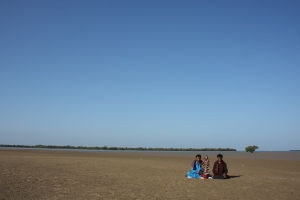screening on 20th August 2011, 6 pm, at nanappa art gallery, cochin-11, followed by "meet the directors".
Like Here Like There
A Film by Anjali Monteiro and KP Jayasankar
52 mins, Sindhi, Kachchhi and Hindustani with English subtitles, 2011,
A Public Service Broadcasting Trust Production
Shah Abdul Latif Bhitai, a medieval Sufi poet, is an iconic figure in the cultural history of Sindh. Bhitai’s /Shah Ji Risalo/ is a remarkable collection of poems which are sung by many communities in Kachchh and across the border in Sindh (now in Pakistan). Many of the poems draw on the eternal love stories of /Umar-Marui/ and /Sasui-Punhu/, among others. These songs speak of the pain of parting, of the inevitability of loss and of deep grief that takes one to unknown and mysterious terrains.
Umar Haji Suleiman of Abdasa, in Kachchh, Gujarat, is a self taught Sufi scholar; once a cattle herder, now a farmer, he lives his life through the poetry of Bhitai. Umar’s cousin, Mustafa Jatt sings the Bheths of Bhitai. He is accompanied on the Surando, by his cousin Usman Jatt. Usman is a truck driver, who owns and plays one of the last surviving Surandos in the region. The Surando is a peacock shaped, five-stringed instrument from Sindh. The film explores the life worlds of the three cousins, their families and the Fakirani Jat community to which they belong.
Before the Partition the Maldhari (pastoralist) Jatts moved freely across the Rann, between Sindh (now in Pakistan) and Kutch. As pastoral ways of living have given way to settlement, borders and industrialisation, the older generation struggles to keep alive the rich syncretic legacy of Shah Bhitai, that celebrates diversity and non-difference, suffering and transcendence, transience and survival. These marginal visions of negotiating difference in creative ways resist cultural politics based on tight notions of nation-state and national culture; they open up the windows of our national imaginary.
About the Directors
Anjali Monteiro and K.P. Jayasankar are Professors at the Centre for Media and Cultural Studies, Tata Institute of Social Sciences, Mumbai. Monteiro has a Masters degree in Economics and a Ph.D. in Sociology. Jayasankar has an M.A. in German language and a Ph.D. in Humanities and Social Sciences. Both of them are involved in media production, teaching and research. A presiding thematic of much of their work has been a problematising of notions of self and the other, of normality and deviance, of the local and the global, through the exploration of diverse narratives and rituals. These range from the stories and paintings of indigenous peoples to the poetry of prison inmates. Jointly they have won twenty two national and international awards for their films. These include the Prix Futura Berlin 1995 Asia Prize for Identity- The Construction of Selfhood, Best Innovation, Astra Film Festival 1998, Sibiu, Romania for YCP 1997, Best documentary award at the IV Three Continents International Festival of Documentaries 2005, Venezuela, for SheWrite ,Certificate of Merit, Mumbai International Film Festival 2008, Indian Documentary Producers Associuation (IDPA) Gold for Best Sound Design, Gold for Best Script and Silver for Editing for the film Our Family. Their most recent award is the commendation for Do Din Ka Mela (A Two Day Fair) in the Intangible Culture (Music-Dance-Performance) category at the 12th RAI International Festival of Ethnographic Film . Vibgyor Film Festival, Kerala and Bangalore Film Society have organised retrospectives of their work in 2006 and 2010, respectively. So Heddan So Hoddan is the second in the series films set in Kachchh that they have made; Do Din Ka Mela (A Two Day Fair) was the first film http://atwodayfair.wordpress.com/
They have several papers in the area of media and cultural studies and have contributed to scholarly journals such as Cultural Studies. They are both recipients of the Howard Thomas Memorial Fellowship in Media Studies, and have been attached to Goldsmith’s College, London and the University of Western Sydney. Monteiro was a Fulbright visiting lecturer in 2006-07 at the University of California, Berkeley. They also serve as visiting faculty to several leading media and design institutions in India and abroad. They are both actively involved in ‘Vikalp‘ , which is collective of documentary filmmakers campaigning for freedom of expression. They are also associated with various media and voluntary organisations.





No comments:
Post a Comment